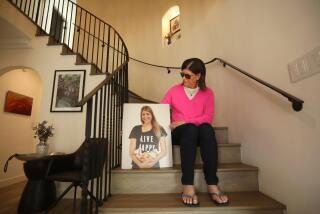Not Too Young to Battle AIDS
- Share via
Please excuse 16-year-old Hydeia L. Broadbent if she gets a little preachy about the dangers of drug use and promiscuous sex.
She is, after all, the first to admit that she’s too young to know everything.
But as the petite teenager told a crowd of about 75 people Saturday at First New Christian Fellowship Missionary Baptist Church in Los Angeles about the difficulties of living with AIDS, which she got because her birth mother used intravenous drugs, she commanded respect.
“They may wear cool clothes. They may walk cool. They may talk cool,” she said, warning teenagers about the dangers of peer pressure. “It doesn’t mean they are cool if they jeopardize their life.”
She also had a few words for widowed senior citizens who may be getting back into the “dating thing.”
“It can happen to you, too,” she warned as the crowd giggled.
Hydeia, who lives in Las Vegas with her adoptive family and travels around the country giving speeches about HIV and AIDS, has been battling the virus, and subsequent AIDS, since she was 3.
She takes four types of medicine to keep her immune system healthy. She has also experienced society’s cruel fears.
When she sneezed in class at the age of 5, her teacher used bleach to try to kill the virus. She said she doesn’t take it personally, thanks to advice from her mother, Patricia Broadbent.
“My mom always said, ‘There’s ignorant people and there’s stupid people,’ ” Hydeia said. “ ‘You can always educate ignorant people, but stupid people are just stupid.’ ”
Hydeia, who was the 1999 winner of the Essence Award for her work as an AIDS activist, spoke during “Healing of AIDS” week sponsored by Balm In Gilead.
The organization raises awareness about HIV and AIDS in response to concerns that the disease is largely ignored by black churches, even though it is a growing problem in the black community.
AIDS is the second leading cause of death for black men and the third leading cause of death for black women, according to the national Centers for Disease Control and Prevention.
The silence on the subject in black churches is particularly troubling, said the Rev. Norman Johnson, pastor of First New Christian, because black churches historically have taken the lead in tackling problems facing the black community.
“We were really slow. I think that not everyone sees HIV, AIDS as a profoundly human problem,” said Johnson. “There was a lot of moral taboos because it dealt with human sexuality and we found it difficult to talk about.”
But in recent years, black churches, spurred by Balm In Gilead, have been making more of an effort to reach out to AIDS and HIV patients, though Johnson admits that many churches haven’t yet moved beyond talk to action--such as creating outreach ministries.
His own church is just now starting to organize such a ministry, he said. But, he added, Hydeia’s speech is a good beginning. Members of the audience, who cried and laughed during her short speech, seemed to agree.
When Hydeia was 6 weeks old, Patricia and Loren Broadbent agreed to take her in temporarily “until someone [would] adopt this little black baby who was addicted to drugs and who would cry through the night because she was going through withdrawals,” Hydeia said.
Patricia Broadbent even took her to an adoption fair in an attempt to find her a permanent home.
“She dressed me up real pretty” and “oiled me up real well,” Hydeia said.
But Loren Broadbent found the process of putting her on display unseemly. A short time later, the Broadbents decided to adopt Hydeia themselves.
When she was about 3, doctors diagnosed her with HIV.
Hydeia said her adoptive mother, a strong person who “wore Afros in the ‘60s and who burned her bras,” suddenly withdrew in fear.
Back then there was little hope for people diagnosed with HIV. Most people were still scared of the disease. It also was seen as a disease of gay white men, not little African American babies.
But Patricia Broadbent soon decided to educate people. She created the Hydeia L. Broadbent Foundation, which helps promote education about the disease.
Patricia Broadbent started going to conferences around the country, speaking about HIV. Soon, Hydeia was speaking too.
“I really didn’t get up and just start speaking,” Hydeia said. “When my mom would talk, I would tug on her shirt and say, ‘You forgot to tell them this.’ Then, she said, ‘Why don’t you tell them yourself?’ ”


